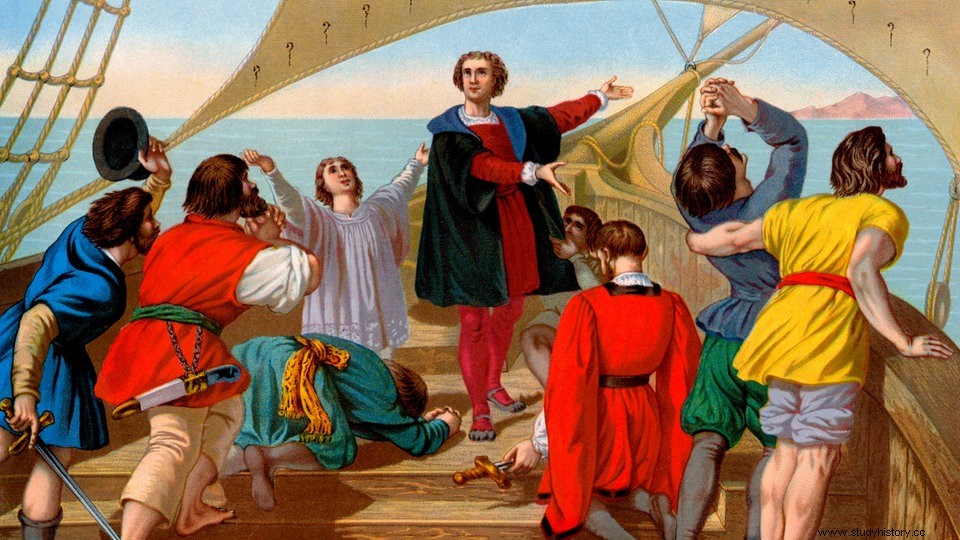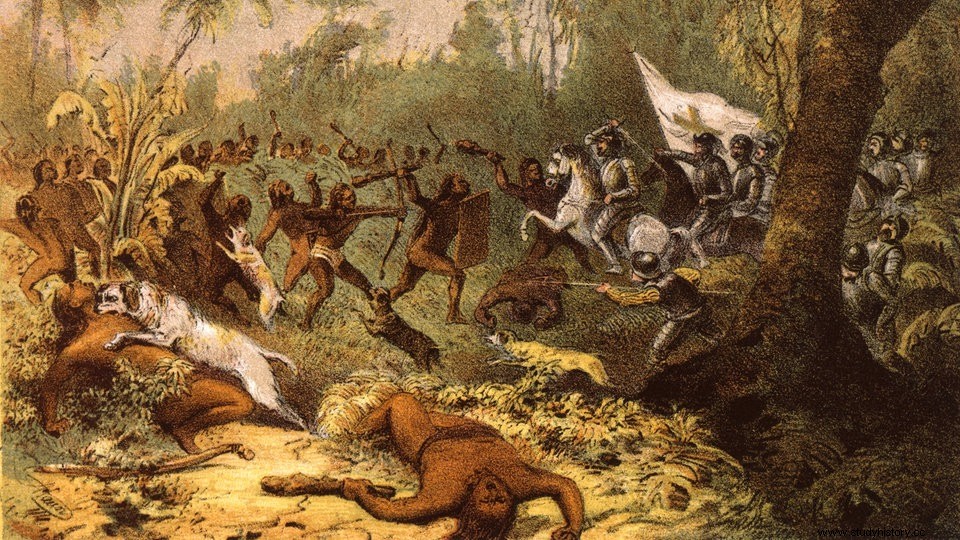Christopher Columbus wanted to find a sea route to Asia and instead reached America in 1492. With his supposed discovery, he encountered another world - and at the same time a new era:The Europeans conquered America and brought immeasurable suffering to millions of people.
Land in sight!
October 12, 1492, late evening:The Atlantic Ocean surrounds the sailing ship "Santa Maria" in black as ink. "The coast isn't far," Christopher Columbus has been telling his impatient men on board for weeks. He actually set out to find a sea route to India and China. But so far there is nothing but sea and disappointment.
And supplies are almost gone. The men on board are beside themselves with anger. But giving up and turning back is out of the question for the ambitious Columbus. He is traveling on behalf of the Spanish queen and has promised her success, gold and spices. So on, into the dark night.
Then, at two o'clock in the morning, a cannon shot suddenly resounded from the boat sailing ahead - as Columbus himself describes it in his log book. Country! As dawn breaks, Columbus finally sets foot on solid ground again. By the time he dies, he will be convinced that he has discovered the way to India. In doing so, he landed on another continent that blocks the western sea route to Asia:America.

Finally land in sight
Others were there before him
In the following centuries, Columbus will be celebrated as the "discoverer" and his voyage will be referred to as the "discovery of America". But that is a doubly wrong term. First of all, even in Columbus' time, one can at best speak of a "rediscovery" - after all, the Vikings landed in North America 500 years earlier.
And secondly, he reaches a continent that has been inhabited for thousands of years and has therefore already been discovered – just not yet by the Europeans. After Columbus' voyage, they begin to conquer America for themselves. After a short time, hordes of European adventurers, settlers and soldiers plunder the country and its inhabitants.

Columbus was extremely brutal against the natives
But now, on the morning of October 12, 1492, everything is still very peaceful. The natives, whom Columbus calls "Indians," approach the newcomers and even gift them with parrot feathers and balls of cotton. Columbus writes that they consider the whites to be emissaries from heaven.
Columbus is intoxicated by the luck of discovery. In the days that followed, he drove on and ended up in Cuba. On today's island of Haiti, which Columbus calls "Hispaniola", he founds a Spanish colony. He returns to Spain with chests full of gold and spices. Even the royal couple stand before him there - a great honor.
Who was Columbus?
Christopher Columbus is finally the man he always wanted to be:a seafaring genius who accomplished a feat that "may not be equaled" - as he later wrote arrogantly about himself.
But is he really that great? One thing is clear:not only do his journeys raise many questions, but also his life story.
Even the year of birth can only be estimated. He was probably born under the name of Cristoforo Colombo in 1451 in the Republic of Genoa, in present-day Italy. As a boy, Cristoforo sees the mighty ships rocking in the harbor in which fairytale goods from the Far East are stored:sugar, silk, gold.
Columbus, son of a wool weaver, initially struggled through with various jobs on ships. This is how his son Fernando later describes his father's life in the biography "Historia del Almirante" (History of the Admiral). Then Columbus hired merchants in Lisbon and in the following years he expanded his horizons enormously - by sailing to the borders of the then known world, probably to the Canary Islands. And he reads what could well lie behind it. He studies maps, stories, travelogues. Above all, the descriptions of the Asia traveler Marco Polo fuel his dreams:he now absolutely wants to find a new way to Asia, to India.
In 1484 he presented his plan to the Portuguese king and later also to Spain - and received one rebuff after the other. Scholars find huge miscalculations in the itinerary of the "mad Italian," as they call him.

A young man with big dreams:Columbus
On behalf of the Spanish king
But in the spring of 1492 the Spanish king changed his mind. Arch-enemy Portugal has secured gold deposits in Africa, and so Spain is desperate to find riches in Asia. Columbus' plan to sail there suddenly tempts the crown. The kings promise him nobility and a small fortune and demand "discoveries and conquests in the East". Columbus agrees.
In August 1492 he set sail from the port city of Palos with three ships out into the Atlantic. The sailing ships are making good progress, but no coast is in sight for more than a month. Probably never before have Europeans sailed so far across the ocean - the Vikings only crossed from Greenland to Newfoundland.
On the morning of October 12, 1492, they actually reach an island. Columbus later names it San Salvador and is the first of many to take possession of it for the Spanish crown.
Columbus' inglorious end
But the story does not end well:not for Columbus and much less for the peoples he "discovers". He will sail west three more times. With more and more men and ever more brutal means, he conquers the islands that he stubbornly believes to be East Asia.
The indigenous people who once saw the whites as friends are dying in their hundreds of thousands from the weapons, bloodhounds and diseases of the Europeans. In the end, only a fraction of Latin America's 50 million indigenous people will survive the 300-year Spanish rule that begins in 1492.
Despite all the fighting, the Spaniards find no treasures, no gold, no precious stones. In addition, living far away is difficult. Unrest breaks out among the Spaniards who are establishing settlements on the American continent; Columbus also acts against them with violence and harshness. When they heard about it at the royal court, he was put in chains and shipped to Europe.
Many scientists have long suspected that something new must be lying behind the Atlantic - not Asia, but a "New World". Only one wants nothing to do with it:Columbus. He justifies himself and insults the doubters.
On May 19, 1506 he died bitter and almost forgotten. The continent he set foot on in 1492 is christened "America" shortly after his death, in honor of another discoverer.
